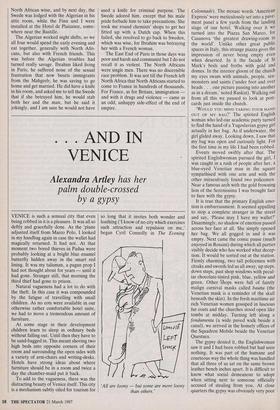. . . AND IN VENICE
Alexandra Artley has her
palm double-crossed by a gypsy
VENICE is such a sensual city that even being robbed in it is a pleasure. It was all so deftly and gracefully done. As the 'plane adjusted itself from Marco Polo, I looked in my handbag again in case the wallet had magically returned. It had not. At that moment two bored thieves in Padua were probably looking at a bright blue enamel butterfly hidden away in the smart red lining. It was my talisman, a pagan prop I had not thought about for years — until it had gone. Stranger still, that morning the third thief had gone to prison.
Natural vagueness had a lot to do with the theft. In this case it was compounded by the fatigue of travelling with small children. As no cots were available in our otherwise rather comfortable hotel suite, we had to move a tremendous amount of furniture.
At some stage in their development children learn to sleep in ordinary beds without falling out. Until then they have to be sand-bagged in. This meant shoving two high beds into opposite corners of their room and surrounding the open sides with a variety of arm-chairs and writing-desks. Hotels have strong ideas about where furniture should be in a room and twice a day the chamber-maid put it back.
To add to the vagueness, there was the distracting beauty of Venice itself. This city is a mechanism subtly oiled for tourism for so long that it invites both wonder and loathing (`I know of no city which exercises such attraction and repulsion on me,' began Cyril Connolly in The Evening `All are loony — but some are more loony than others.' Colonnade). The mosaic words 'American Express' were meticulously set into a pave- ment panel a few yards from the landing stage of our hotel. Walking over it we turned into the Piazza San Marco, for Casanova 'the greatest drawing-room in the world'. Unlike other great public spaces in Italy, this strange piazza gives the impression of never being empty even when deserted. In it the facade of St Mark's boils and froths with gold and domes. In the interior gloom of the church my eyes swam with animals, people, sea- monsters and saints (`under foot and over heads . . . one picture passing into another as in a dream,' noted Ruskin). Walking out from all this we paused to look at post- cards just inside the church.
`WOULD YOU MIND TAKING YOUR HAND OUT OF MY BAG?' The spirited English woman who led our academic party turned to find the hand of a Yugoslavian gypsy girl actually in her bag. As if underwater, the girl glided away. Looking down, I saw that my bag was open and curiously light. For the first time in my life I had been robbed.
Events moved swiftly after that. The spirited Englishwoman pursued the girl, I was caught in a rush of people after her, a blue-eyed Venetian man in the square sympathised with one arm and with the other miraculously found two policemen. Near a famous arch with the gold frowning lion of the Serenissima I was brought face to face with the gypsy.
It is true that the primary English emo- tion is embarrassment. It seemed appalling to stop a complete stranger in the street and say, 'Please may I have my wallet?' Disarmingly, no shadow of emotion passed across her face at all. She simply opened her bag. We all gogged in and it was empty. Next came the comic pause (much enjoyed in Rossini) during which all parties visibly decide who has worked what decep- tion. It would be sorted out at the station. Firmly charming, two tall policemen with cloaks and swords led us all away, up steps, down steps, past shop windows with pecul- iar chocolate-tinted pink, blue, yellow and green. Other 'shops were full of faintly malign carnival masks called bautta (the Venetian mask is a reminder of the skull beneath the skin). In the fresh maritime air rich Venetian women gossiped in luscious fur coats and the churches stood open like tombs at midday. Turning left along a fondamenta (a wide paved walk beside a canal), we arrived in the homely offices of the Squadron Mobile beside the Venetian Questura.
The gypsy denied it, the Englishwoman saw it and I had been robbed but had seen nothing. It was part of the humane and courteous way the whole thing was handled that all three of us sat on the same brown leather bench inches apart. It is difficult to know what social demeanour to adopt when sitting next to someone officially accused of stealing from you. At close quarters the gypsy was obviously very poor and pungently dirty. Her face was badly marked and in a city still noted after centuries for personal vanity and love of fine dressing, her clothes were painfully humble, coarse and run up from some kind of pre-Gorbachev stuff. I felt it could well be a terrible mistake. As with many other genuinely poor people in this situation extraordinary dignity would be her only defence.
In a room with a biro notice involving the word `denonce' sellotaped to the door, we all gave statements. Feeding a huge form with three sheets of carbon paper into a high-rise typewriter, two policemen wres- tled with the problem of putting truth to paper. The gypsy had to spend the night in custody and I wondered if she would be afraid. On a close-circuit television the canal lapped up and down outside to soothe the nerves.
Travelling by water makes even the most serious journey rather festive. Next morn- ing I was handed into a business-like police launch (`care-ful Sig-nora') with my youn- ger daughter, the Englishwoman, another witness who had come forward, the nice policeman who had done an exchange course at Scotland Yard (he liked the uniform but not the helmet), a nervous young interpreter with intellectual Milanese dash and the gypsy. When she saw the baby, her face flashed with plea- sure for a moment, but we all looked away. Fluttering with official pennants, the launch churned through quietly dripping back-canals strung with ingenious washing- lines and popped out somewhere near the Rialto bridge.
In the Venetian magistrate's court, one hour passed, then two. The law's delay. The baby crawled up and down a Fifties corridor, looking in at open office doors and chewing grissini (those long biscuit sticks). This time the gypsy sat on a bench further away from us, waiting for her defence lawyer who wore a Loden coat. She was smoking now and there was a distinct undertow of fear. I reflected on what I had lost.
The missing blue butterfly came from a rather grand spiritist who still lives in Dorset in a caravan called `Xanadu'. Like other difficult things in modern life, it is a chilling survivor of the early Seventies, a time of bizarre and intense spiritual activ- ity. During all-night seances mirrors swung on the walls. In their strange drawing-room decorated according to the principles of Rudolf Steiner, my landlord and his wife seriously quarrelled over the existence of fairies and a mad youth arrived in a green velvet cloak, travelling along the ley lines to bring a message from Gandalf s Garden. For people who did not want to enter Tolkein's maze, there was the cold pure channel of Buddhism. 'The blue butterfly will dance ahead of you to bring good fortune in a new era.' It was only a pagan prop, but still I wanted my talisman back. Already it seemed to have harmed the gypsy and its proper place was with me. I asked the interpreter to tell her this. 'She is a gypsy, she will understand.' The daughter of secular industrialised Italy looked at me with curiosity and thought, 'You are not a rational woman'. In any case, legally it could not be done.
Portia, who wore tinted specs, turned out to be rather more glamorous than her equivalent on the English bench. I was glad I kept my end up by wearing rather a good pair of earrings. As she heard the case I thought how clever Venetian women still are at lightening their hair (they used to sit on top of the house on a wooden platform called the altana to bleach it with Renaiss- ance horse manure in the sun).
Three train tickets to Padua had been found on the gypsy and she had been convicted there and in Trieste of robbing tourists. She was already on probation and this time she would go to jail. One thousand Yugoslavian gypsies are arrested in Venice every year for petty theft and with this trio the disturbing talisman of my youth had gone. Like many other people of our generation I had long since reverted to another faith, so what should it matter? Whether the blue butterfly will bring good fortune to the two escaped thieves in Padua I do not know.



















































 Previous page
Previous page